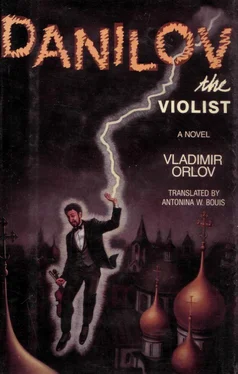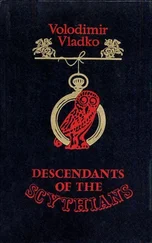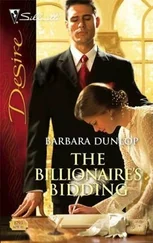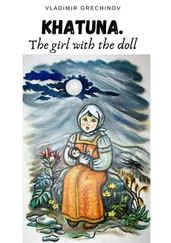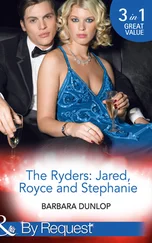The movie ended. Ekaterina Ivanovna said good-bye and went to the streetcar. Kudasov peeked out from around a corner, nursing one last hope. But he saw what was going on and slipped away in annoyance. Danilov stood in the silence of the black-and-white street with Natasha.
"I live near Pokrovka," Natasha said, "in Khokhlovsky Alley."
"That's my favorite part of Moscow," Danilov said, honestly happy. "The alleys of the Old Gardens. Seeing them at night will be a joy."
"You'll take me home?" Natasha looked up.
"I would consider it an honor if you would allow me."
They walked along the banks of the Yauza, and then crossed the boulevard and wandered down the bare asphalt field of the Khitrov Market until they got to Podkopavevsky Alley and then at Nikola in Podkopai they turned toward the Khokhly. To their right quietly rose the darkened palace of the Shuishkys, and beyond, the long headquarters, sky-blue in daytime, of the Social Revolutionaries, which was stormed in August 1918 and was now a kindergarten. In the crook of Khokhlovsky Alley they came upon the nocturnal hum of Jurgenson's Music Publishers, now a music typography shop. Jurgenson's always filled Danilov with thoughts of Peter Ilych Tchaikovsky, who had brought his pages here, the ink still wet. Natasha was silent, and Danilov said nothing to her about his favorite places in this tangle of crooked alleyways. For some reason he was sure that Natasha was feeling everything that he was. At Trinity in Khokhly, its lacy gilt flower of a cross glimmering freshly even at night, they stopped. To the left ran a footpath to Kolpachny Alley, to the palace of net-man Mazeppa.
"I live in that big building," Natasha said.
"What a coincidence!" Danilov said. "I often come here. I walk the hills, when I'm tired..."
"Do you know," Natasha asked suddenly, "why Misha Korenev refused to play?"
"I don't know. Did you come to the concert because of him?"
"No. I would have come anyway. But he sent me such a strange letter today. Something about Paganini and -- "
"Are you friends?" Danilov asked, already jealous of Korenev.
"Yes ... we were friends," Natasha mumbled. "I've known him a long time. We were in Perm ... I had run away from home, from Moscow, with a man I loved then to join the theater. I was just a girl, I dreamed of becoming an actress..."
"Are you an actress now?"
"No. I'm a lab technician. Katya and I work at the same institute. It was all so long ago and it ended so sadly!"
She turned abruptly and headed for her oppressive, gloomy house. Danilov hurried after her and thought: "What is it that I like about her? Her hair, her eyes, and hands, and shoulders, and knees, and voice ... I don't know her at all, I don't know if she's stupid or smart, whether she has a conscience or if she's dishonest, bighearted, or petty... I don't know ... and I don't care ... I can't analyze my feelings... That's how to lose them... No, I know one thing already: She's a good and kind person ... she is my kind of person... But what difference does it make, anyway?"
"That's it, we're here."
"I want to see you again," Danilov said with a sigh.
"So do I," Natasha said solemnly.
Danilov's right hand (his instrument was in his left) touched Natasha's hands. He felt their goodness, and shyly but determinedly he pulled Natasha toward him and kissed her. She responded, and there was no hesitation in her manner.
They stood on the stairs near Natasha's apartment and could not let go of each other for a long time. Time dripped into a clay pitcher and thickened into clover honey. Finally Natasha moved away from Danilov, looked at him intently with her marvelous gray eyes, unlocked her door, and shut it with a bang behind her.
"You can lose your head like this," thought Danilov emotionally. He sank to a step of the hundred-year-old stairs, only to realize that he did not have his viola.
He rushed down the stairs. The viola was nowhere to be seen.
He dashed into the street. He searched, sometimes with his hands, all the places where he had stood with Natasha and where he remembered having the instrument, but it was in vain.
The viola had vanished.
6
The next morning Danilov received a call from the flutist Bocharov from the pops orchestra, who told him that yesterday their conservatory classmate Misha Korenev had committed suicide. The services were tomorrow at noon on Kachalov Street, and the funeral was to be at Babushkino Cemetery at two.
"How could this be?" Danilov whispered into the phone.
Bocharov explained that he didn't know any more himself, he was just supposed to call all Korenev's friends. The only tiling he did know was that Korenev had thrown himself out of his apartment window, which was on the fifth floor of a co-op near the Shcherbasky metro station. He left a note -- "Please don't blame anyone ..." -- on a scrap of newspaper. His bow was on the floor, the violin on the table, and Pa-ganini's twenty-first capriccio on the music stand. The first people to reach the apartment got the impression that Misha had been playing, then tossed aside the violin, and jumped out the window.
"I thought he was married?" Danilov inquired.
"He was," Bocharov said. "He had a wife and two daughters."
Danilov could not get out of bed for a long time. Finally, he sighed, got up, and put on his shirt. He had to go to the police and then to the insurance company.
"He had written something to Natasha about Paganini," Danilov recalled.
At the police station he reported the loss of his viola and asked them to locate it. He informed the insurance company of his disaster, too. He went to the lost-and-found and looked through the things found in the metro but did not find his instrument.
At the theater, Danilov was immediately called to the phone. On the other end was Muravlyov's voice.
"Vova," said Muravlyov," we took the fur coat down to the secondhand store. So very soon you'll get five hundred rubles to pay back the Dobkins for your viola."
"Thank you, Vitya! And tell Toma, please, how grateful I am," Danilov said, touched. "Please forgive me about last night."
"Forget it," said Muravlyov magnanimously.
In the orchestra pit Danilov's appearance with his cheap viola elicited general astonishment. The other players liked Danilov and they sympathized with his torment during the siege of the widow Gansovsky. Now an attentive ear could discern a certain nervousness and an occasional gentle high tremolo of irony in the orchestra's tuning up.
Danilov felt bad. He wanted to tell his colleagues about the disappearance of the Albani, but he said nothing. He was afraid that telling the truth would jinx his hope that the instrument was just about to be returned to him. That hope was already as shaky as an aspen leaf. "Oh, if only some crook had stolen my viola!" dreamed Danilov. Then it would be found for sure -- Danilov had faith in the police. This dream was sweet, but only a dream, and Danilov knew it. He was almost certain that if there were a crook, it would be no ordinary crook. Perhaps the ambitious chess player Valentin Sergeyevich had been given another delicate assignment.
If he was being mocked or tested as Time X approached, Danilov ought to manifest self-control and patience. He convinced himself of that with great difficulty. Of course, if Danilov were to dip into the demon state now, he could easily trace the instrument. But that was all that Valentin Sergeyevich, and, more importantly, whoever was behind him, needed. By now they must be bored with their work and waiting for Danilov to crack.
Danilov had another reason for not switching to demonic mode: He had decided to deal with music only as a human. Otherwise there would have been no end to the marvels he could show the world. But he no longer would have been on an equal footing with humans, and Danilov wished to play by the rules. He was determined not to retreat from this decision in the smallest detail. "Maybe it's for the best," Danilov suddenly thought, "that my Albani has vanished. Any fool can play well on an Albani, and if I'm planning to be a great musician, I have to sound like I'm playing a great instrument even when I'm not." He calmed down a bit, convincing himself that, in a short while, he would be playing marvelously on his three-hundred-ruble viola, too.
Читать дальше
